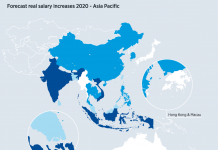Japan supermarket chain uses AI to gauge staff smiles, speech tones in quality service push
Japanese supermarket chain AEON has adopted an artificial intelligence (AI) system to assess and standardise its employees’ smiles, renewing the debate about workplace harassment. On July 1, the national brand announced it had become the world’s first company to promote a smile-gauging AI system, which it is using across its 240 shops around the country.
Called “Mr Smile”, it was developed by the Japanese technology company InstaVR and is said to be able to accurately rate a shop assistant’s service attitude. The system draws on more than 450 elements including facial expressions, voice volume and tone of greetings. It has also been designed with “game” elements that invite staff to improve their attitude by challenging their scores. AEON said it ran a trial of the system in eight stores with about 3,400 staff members, and found service attitude improved by up to 1.6 times over a period of three months. The artificial intelligence system measures facial expressions and voice patterns. The company said its goal was to “standardise staff members’ smiles and satisfy customers to the maximum”.
The policy has sparked concerns over whether the AI system increases workplace harassment, especially from customers – a serious issue in Japan. Known as “kasu-hara”, customer harassment comes in the shape of abusive language and repetitive complaints. This year, nearly half of the 30,000 staff surveyed, who work in the service industry and other sectors, reported experiencing customer harassment to Japan’s biggest union, UA Zensen. “When the service industry workers are forced to smile according to a ‘standard’, it looks to me like another form of customer harassment,” one respondent said. “Smiles should be a beautiful, heartfelt thing, and not be treated like a product,” another said. “People are different, and they also express their affections differently. Using a machine to ‘standardise’ people’s attitude sounds cold and silly,” said a third.
The strategy has been compared to one launched by McDonald’s in Japan, called “Smile zero yen”. The fast food chain’s Japanese branch has had “Smile” written on its menus since the 1980s, which it prices as “0 yen” to highlight that it costs nothing to greet customers with a smile. The idea has been increasingly questioned in recent years because it is seen as adding a burden on the employees who get the lowest hourly rate of pay in the country. After Japan’s Ministry of Health, Labour and Welfare published a manual of instructions against customer harassment in 2022, more companies were urged to maintain service standards without sacrificing the well-being of staff.
Recently, news that a supermarket in Japan’s Fukuoka prefecture, on the northern shore of Japan’s Kyushu Island, had implemented an extra-slow checkout counter, where customers can spend up to 20 minutes checking out without feeling pressured, was well received. The measure was intended to show consideration for elderly and disabled customers. Yet, despite having fewer customers passing through the checkout, sales increased by 10 per cent, according to Asahi TV.
SCMP























